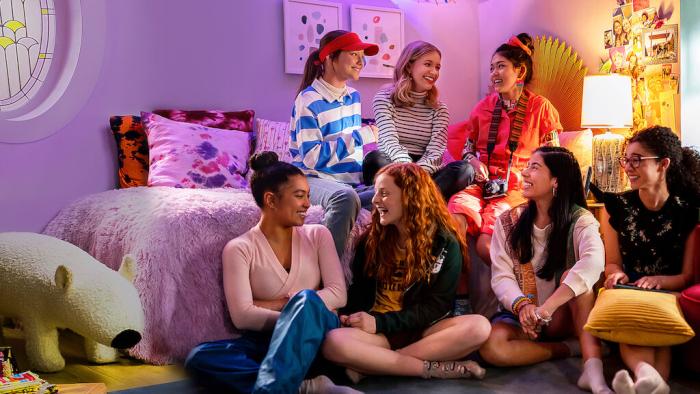

The Netflix Algorithm Giveth, and the Netflix Algorithm Taketh Away
By Dustin Rowles | TV | March 18, 2022 |
By Dustin Rowles | TV | March 18, 2022 |

Unlike some other algorithms, the Netflix algorithm is not particularly mysterious. There is no secret sauce. Netflix is a business, and it’s a business with very specific, data-oriented goals. Sometimes, for instance, a show can be very popular, and it can be critically beloved, but if it’s not watched by the right kind of people, and if it’s not viewed in the right kind of manner, then it will not be renewed (see, e.g., The Santa Clarita Diet).
The latest unfortunate casualty of the Netflix algorithm is The Babysitter’s Club. I will concede that I have never seen The Babysitter’s Club, but my wife and the twins love it. However, they are not the right people, and they do not watch it in the way that Netflix wants it watched. At least, that’s what I gather from Rachel Shukert, who spoke to Vulture this week about why she thinks Netflix canceled her series after only two well-received seasons.
According to Shukert, the cancelation ultimately came as a surprise, at least based on the metrics she had received. The show was doing as well as the first season, and it had a passionate following. But then Squid Game came along, and what was once seen as good enough to merit renewal was not necessarily good enough for the streamer anymore. Squid Game was huge, and like an NFL QB being signed to the largest contract in NFL history, it raises the bar on what is possible, not just in America but worldwide. It’s those worldwide numbers that drive subscriber growth these days. In the wake of Squid Game, a “solid performer” no longer guarantees a renewal.
The Babysitter’s Club is not a worldwide hit, and it’s not a monster hit in the United States, either, so a show that was once on the right side of the bubble drifted to the wrong side. It may have strong appeal with pre-teen girls and their parents — a criminally underserved demographic, as Turning Red has illustrated — but that’s not a new audience for Netflix, and therefore another season would not drive more subscriber growth, and new subscribers — not keeping existing subscribers happy — is the name of the game for Netflix.
The other problem, as Shukert pointed out, is that the viewers who did watch The Babysitter’s Club did not watch it in the way that Netflix likes its series to be watched, which is to say: In huge binge-sessions, the sort that can propel a show into its weekly top 10.
“Completion rates are a big deal,” Shukert told Vulture, “and our show takes longer to complete because it’s for a younger audience. Parents don’t necessarily let kids sit and watch six hours of television at a time — probably rightly! Or they want to save it so they can all watch together.”
This was exactly the case for my family, where the twins were required to read each book before they could watch the episode and they had to wait until their schedules lined up with their mother’s schedule to watch, which meant that they did not watch the entire second season on the Saturday after it premiered. They watched an episode here and there until they’d finished it over the course of several weeks.
We often believe that Netflix might do well by changing their model and releasing episodes weekly so that a popular show can be discussed and grow over the course of weeks or months. That’s just not the way that Netflix works. It wants huge audiences who watch seasons quickly. That’s fine — those shows have their place — but I do think that creators uninterested in tailoring their content to an algorithm might be wise to look elsewhere — Apple TV+ or HBO Max — to place their shows.
As it stands, unfortunately, it’s probably too late for The Babysitter’s Club, because even if they could find another home for another season or a wrap-up movie, by the time they did so, the cast will have aged out. So it goes: The Netflix algorithm giveth, and the Netflix algorithm taketh away.
Source: Vulture
← Daniel Radcliffe Says No to Harry Potter 'Cursed Child' Movie | The Best Highlight from the March Madness Tourney, So Far, Came from a Cheerleader →
More Like This
'The Office' Reboot Adds 'Nathan For You' Co-Creator
The New ‘House of the Dragon’ Trailers Ask if You’re Team Green or Black
The Experiment With Diversity Is Over in Late Night TV, Suggests Dulcé Sloan
Jordan Klepper Got A "Glimmer Of Hope" From A Trump Supporter
Leave Josh Peck Alone, Says Drake Bell in the Wake of 'Quiet on the Set' Revelations

The Experiment With Diversity Is Over in Late Night TV, Suggests Dulcé Sloan
Jordan Klepper Got A "Glimmer Of Hope" From A Trump Supporter
Leave Josh Peck Alone, Says Drake Bell in the Wake of 'Quiet on the Set' Revelations
Sophie Turner Has ‘Reactivated’ Her Divorce From Joe Jonas
Is Aaron Taylor-Johnson The Next James Bond?
Sydney Sweeney Is All Business When It Comes to ‘Madame Web’: ‘That Film Was a Building Block’
More Like This
'The Office' Reboot Adds 'Nathan For You' Co-Creator
The New ‘House of the Dragon’ Trailers Ask if You’re Team Green or Black
The Experiment With Diversity Is Over in Late Night TV, Suggests Dulcé Sloan
Jordan Klepper Got A "Glimmer Of Hope" From A Trump Supporter
Leave Josh Peck Alone, Says Drake Bell in the Wake of 'Quiet on the Set' Revelations
Reviews